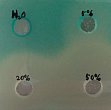Chemical Biology
Organisms are in constant exchange with their surroundings. Chemical compounds play an important role in this aspect and serve as communication molecules between the different organisms (e.g. plants, insects and other animals, or microorganisms). We are interested in the chemical nature of these compounds and their biological activities.
We are also interested in the reasons, why organisms produce certain specialized metabolites, and how these metabolites interact with their biological targets.
Past Projects
Quorum-Sensing molecules from cyanobacteria

Quorum sensing refers to the capacity of bacteria to monitor their population density and regulate gene expression accordingly. This allows bacteria to adopt social behaviour in order to gain benefits over competitors, conquer new niches or sustain survival of the population. The inhibition of quorum sensing (QS) systems in pathogenic bacteria has been discussed as a new promising strategy for anti-virulence therapy, since many pathogenic bacteria use QS to regulate the expression of virulence factors or the formation of biofilms.

Although cyanobacteria have gained much attention as a prolific source for novel bioactive compounds, little is known about QS between cyanobacteria or about cyanobacterial natural products interfering with the QS of other bacteria. This motivated us to search for QS interfering metabolites from cyanobacteria as well as to study their bioactivity in more detail (e.g. identifying their targets in the QS systems of other bacteria). We are not only aiming at a better understanding of chemical communication between bacteria, but also hope to be able to identify compounds that can serve as lead structures for the development of anti-virulence drugs.

Tomasz Chilczuk has been working on this project, which was funded by the DFG (GRK 1708) before we moved to the University of Halle-Wittenberg.





